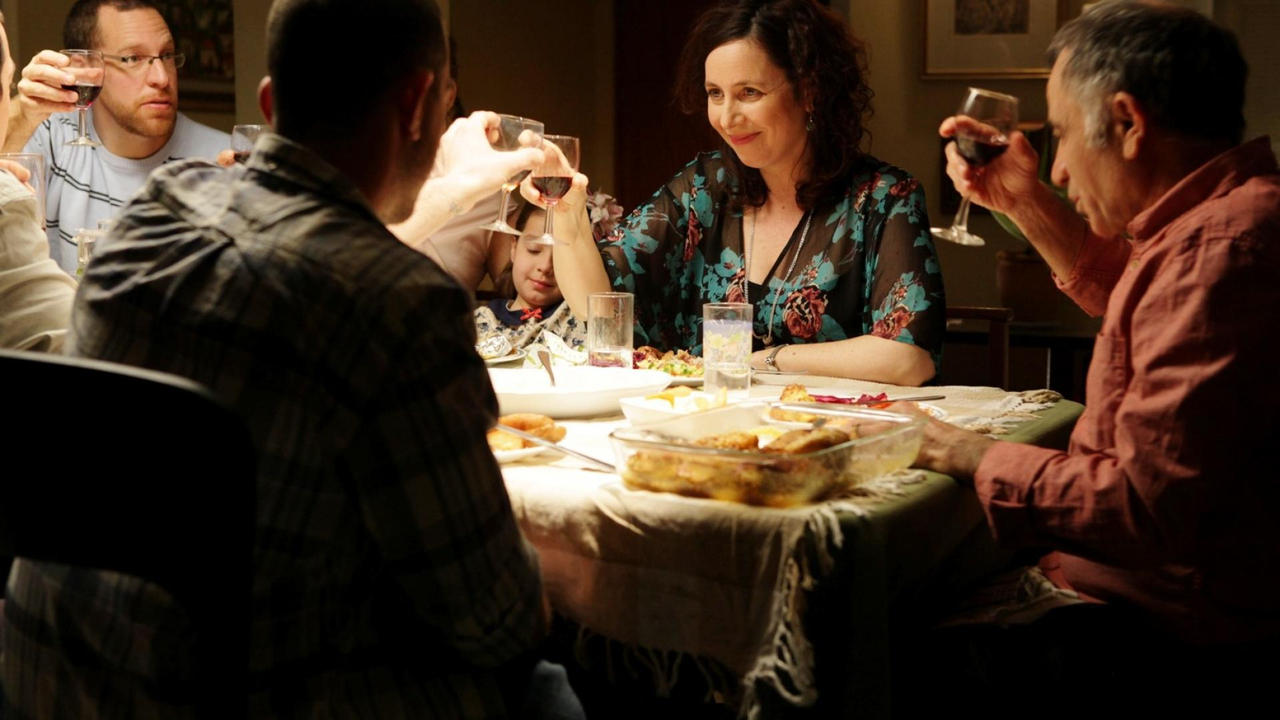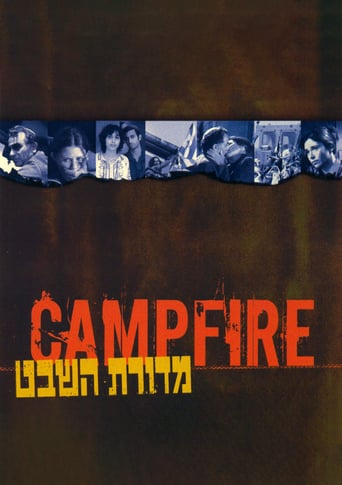

Campfire takes place in Jerusalem in the 1980s, and tells of the Gerliks, an Orthodox family headed by young widow Rachèl (Michaela Eshet), mother of two daughters, young teenager Tami (Hani Furstenberg), a member of the Orthodox Bnèi Akìva youth movement, and Esti (Maya Marón), a few years older. Rachel insists on rebuilding her disintegrating family following the death of her husband and the girls' father. She applies for acceptance to a group founding a settlement in Samaria, but the acceptance committee does not want a single parent. The absence of a man in their lives exposes the Gerliks to ongoing threats and harassment from their own (Orthodox) community, whether in the form of pressure on Rahel from her settler friends to remarry, or in the form of vulgar taunts aimed at Tami by the neighborhood boys, culminating in a rape scene.But first, we see Rachel coming home from a meeting of her settlement group when she hears sounds in the stairwell. She nears the source of the sounds and through a broken window, sees Esti making out with her boyfriend. Rachel smiles at the sight of her daughter evoking such desire, enters the house, and telephones Yossi (Moshe Ivgy), a suitor, and asks him to accompany her to a settler rally the following day.In the rape scene, which takes place on Lag BeOmer, Tami – who is in the initial stages of discovering her womanhood and budding sexuality – reluctantly joins her friend Inbál (Dina Senderson) at the "rebels'" or bad boys' bonfire – which they build at a distance from the "goody-goody" bonfire – one of whom, Rafi (Oshri Cohen) Tami has a crush on. At first, they all gather around the fire and tell dirty jokes. After a few of these, Inbal wants to leave as she disapproves of the boys' behavior. She agrees to wait for Tami, who's actually enjoying herself, in a car parked nearby. As soon as Inbal is gone, Ilán (Danny Zahavi), who's on leave from the army, puts his hand on Tami's thigh. She recoils and wants to leave, but he pins her to the ground and tries to kiss her. After a few seconds, he releases her and asks her if she's alright. Frightened and crying, she gets up to leave, when Ilan seizes her from behind, twisting her arm and covering her mouth, and says to his friends, "What?! This is how you treat them (meaning women)!" Their weak protests have no effect, and they move to cheering, "Ta-mi! Ta-mi!" as Ilan forces her to touch his penis.On a visit of the settler group to the site of their future home on a wind-whipped hilltop, one of the teenage boys corners Tami and tries to get her to confirm the rumors he's heard about what happened to her at the campfire. He tells her, "It's OK. It's natural," hinting to her what awaits her when they're both residing in the same tiny, isolated community. She replies, "What? What's natural?"Campfire exposes the hypocrisy of the Orthodox community in the film, which denies and silences the rape. Tami tells no one what happened on Lag BeOmer, shutting herself in her room. Rachel, unsettled in the face of her daughter's silence, demands of her fellow community members to investigate what took place that night. Not only do they refuse, but hint that her daughter's behavior invited the boys' actions. Consequently, Rachel decides to leave the settlers' group.At the end of the movie, we see Rachel, her daughters, and Yossi – now her fiancé – happily riding in the car that belonged to Rachel's deceased husband – which had stood idle since his death – symbolizing the rebirth of the familial patriarchy. Tami's rape, which remains suppressed and unspoken of, is located in the narrative of family melodrama, and its role is dual: It serves to expose and criticize the loss of values and "departure from the path" of the Orthodox community, and at the same time reaffirms the nuclear family and mends the ideological tears in the community's fabric.
... View MoreThis movie made me furious. Tammy is verbally abused in front of her mother (I don't think the boys would have behaved this way if she had been with her father)at the beginning of the movie--even though she dresses modestly-- and then later raped off-camera. Rafi, the boy who likes her does nothing to stop it--the rapist tells him not to be a snitch (the implication being that it is more important for Rafi to look good to his friends than to protect someone he cares for). Tammy's mother tells her that she can talk to a professional, but she chooses to remain silent and not report the rape to the police. The rapist is not punished.I didn't want to go to Israel by myself before I saw this movie, but I'm even less inclined now. The middle eastern attitude towards women is for $#!t regardless of faith (Armenians are mostly Christian).
... View MoreThe first question that popped in my head once the ending credits appeared, was- should I be offended?This movie, after all, deals with religious-Zionists and I am a movie-buff secular so maybe the depiction of this much maligned (for no justifiable reason, in my humble opinion) sector was credible and not a slanderous attack. I believe I have reached a conclusion.Today, when a new rift in Israel is emerging over the implementation of the disengagement program lead by prime minister, Ariel Sharon, it's easy to relate to the 1981 struggle against the evacuation of the Sinai peninsula after the signing of the historical peace accord with Egypt.1981 found Tammy Gerlik (Hani Furstenberg in a wonderful performance) in a Jerusalemite neighborhood with her older sister and widowed mom who decides to move to a new settlement in the occupied territories with her circle of the religious, patriotic and unified but also hypocrite and mistrusting circle of friends. It also finds Tammy in her teenage years when romantic feelings and self-defining questioning begin to emerge. Her generally cheerful personality suffers a major setback when Tammy is nearly raped by a violent teenager with the cheering of his dubious "buddies". With a mother too self-absorbed, and "friends" that tag her as a promiscuous girl, she finds a soul mate in her rebellious sister that is alienated to her mother for abolishing her chance of privacy in a very boisterously funny scene that involves a hammer (can't elaborate, sorry).In the meantime, the mother, Rachel (Micaela Eshet, in a reasonably good but not much more, performance), is a 42 year old strong woman who had married too early and went through life without falling in love. While shunning as delicately as possible the courting of a highly renowned and severely boring, cantor, she forms a friendship with, Yossi, a bachelor bus driver/ultimate loser who has lost hope of ever conjugating (let alone, wed) an actual woman.With Yossi as a refuge from the pretense of a strong willed woman, Rachel realizes the true nature of her friends, the frailty of their loyalty and worst of all, their obsession of sweeping unflattering phenomena under the carpet, even at the grave price of perpetuating it for posterity. The movie is well acted, credibly written and even manages to give the audience the atmosphere of the early 80's when Israelis had one TV channel to watch, one telephone company and a strong sense of patriotism that is disparaged and demonetized by too many these days.Which brings me to my question in the beginning of this review, should I, the secular guy (who identifies with Yossi the bus driver more than he wishes), should be offended when the religious society is presented in a very critical manner.The answer to that question is simple: when you are offended on behalf of a grown up group for being disparaged, you might be disparaging it yourself by deciding for them how they should feel.I feel, personally, that the director, Yosef Cedar (who grew up in a religious background but is pretty estranged to it, according to his own testimony) decided to "indict" his origins. As a result, the viewer is deprived from an unbiased impression of one of the most enigmatic, controversial and riveting sector in contemporary Israeli society.The movie won as best film in the Israeli Oscar competition and its victory was outshone by the fact that the movie "sof haolam smola" which was one of the most popular films in Israeli history, wasn't even nominated in any of the major categories.Unfair representation of "Sof haolam smola" in the Israeli Oscar robbed the movie of the buzz it could have generated. Also, the film's unfair representation of a certain sector in the Israeli society left me questioning its antagonism, rather than enjoy its undeniable qualities. Qualities it hones in abundance.8.5 out of 10 in my FilmOmeter.
... View MoreTake it from me, as one who is blood and flesh of this community, this is an extremely poignant and ACCURATE film, aside from being first-class cinema. Watching Asi Dayan as the founder of a settlement, Moshe Ivgy as a religious-Zionist loser/tragic hero and the hysterical Yehoram Gaon play an ASHKENAZI cantor was an incredible combination. Enjoy!I think this policy of writing a minimum of ten lines is quite stupid as i am sitting at work right now and do not have the time to compose a magnum opus - this is a stupid policy that undermines intelligent people like myself who do not write long dissertations on films and know that most people do not have the patience to read such diatribes. Thank you.
... View More